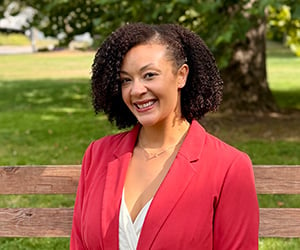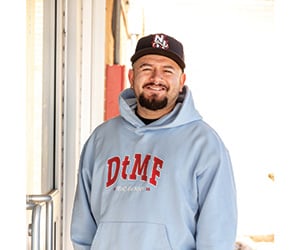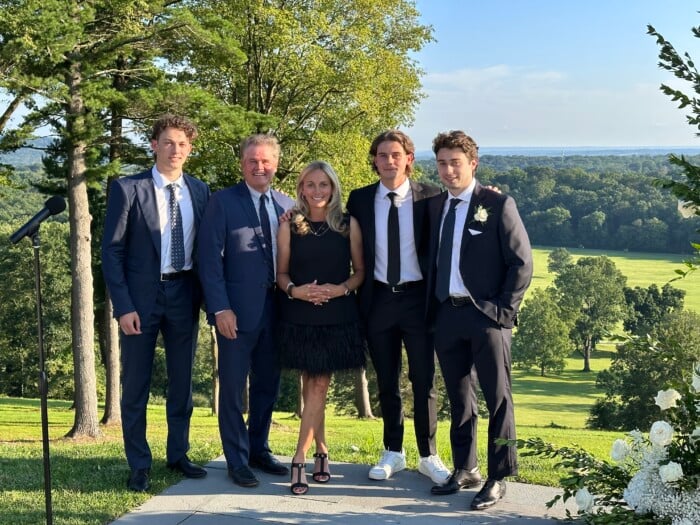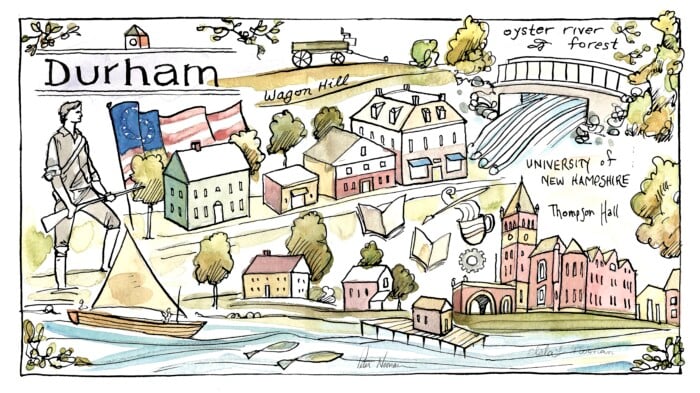The sky’s the limit
Open Sky theater program at NH Prison for Men opens doors to a better future
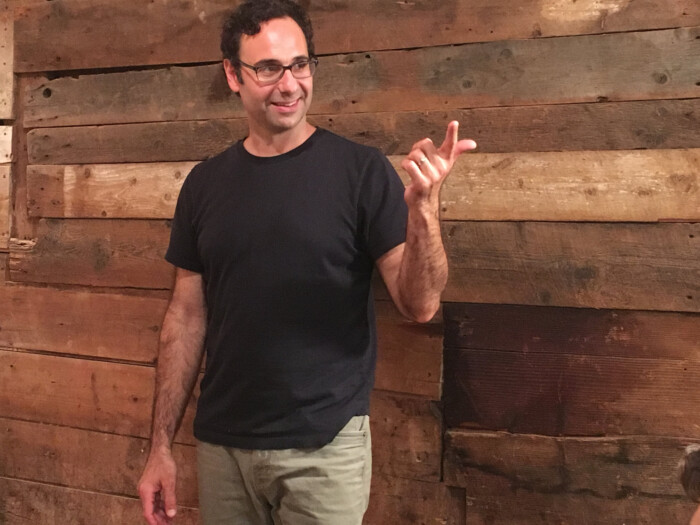
Derek Lucci is an actor, director and theater coach who founded the Open Sky program at the NH State Prison for Men in 2019. (Courtesy photo)
Three men argue over a piece of art — a nearly blank white canvas. Their conversations range over days from one of their homes to another, and are at times funny, wheedling, angry, explosive, tender. An audience watches them, riveted.
The audience and the three men — actors exploring roles, intentions, relations; playing to get to something very serious at the heart of human relationships — are all for a few hours fully immersed in these characters’ lives and the spaces they inhabit.
The play ends. The audience returns to their seats, where they have been sitting all along. Bleachers and plastic chairs in a prison gymnasium. The space before them is nearly empty but for a spare set of props and flats, blocky shapes, just a suggestion of the homes the characters so tangibly inhabited moments before.
The three men, now actors, and now again also men who are incarcerated, bow and beam, in standard-issue prison uniforms. No costumes, no stage lights. Just the text and people exploring it, stripped down to its relational essence.
The audience, invited from the community beyond the prison walls, leap to their feet, clap thunderously and exchange awed comments. Something transformative has happened, and they work to describe it to each other as they are led out of the gym and across the prison yard by the guards.

New Hampshire Business Committee for the Arts Board Chairman Tom Raffio, president & CEO of Northeast Delta Dental, presents Derek Lucci with the 2024 Bayberry Financial Services Artrepreneur Award for his work with Open Sky. (Photo by Jodie Andruskevich)
This innovative theater program at the New Hampshire State Prison for Men in Concord offers residents the opportunity to develop personal and interpersonal skills, providing them tools and hope for a future beyond their sentence.
Conceived and created by actor and director Derek Lucci, the Open Sky program was launched in 2019. It recruited and developed a core group of volunteer student actors and a tech crew, all comprised of prison residents. Over the course of training and rehearsals, the actors say they gained powerful insights into themselves and the deep, complex nature of the other characters with whom they inhabit the stage, and the world.
Inmates take center stage
In 2024, after months of intense training, Open Sky participants rehearsed and presented a full run of Yasmina Reza’s play “Art” in the prison’s gymnasium. About 650 prison residents and an invited audience of supporters and stakeholders saw it during its run. The group performed 16 shows over three weeks, two shows a day.
The actors received standing ovations.
“Derek allowed us to find for ourselves the meaning and relationships between the stage, the actor and audience,” said one Open Sky participant. “I cannot emphasize enough the profound relief, and a sort of giddy fear, I found in myself when I stepped onto the stage and felt permission and space to open myself up to an audience that I knew would listen and see me for as long as needed to explore those feelings.”
Lucci said there is a minimum of one year of commitment to Open Sky. While 28 men showed up to start the training at first, they self-selected as the commitment and investment grew, and the group winnowed to a dozen or so actors. Two months out from production the group was joined by more than 30 other resident volunteers to help with the technical design and production work including set and prop building, tickets, posters and programs.
“It’s a slow, different process,” Lucci said. “Actors cultivate a rich facility with attention that is steeped in listening. Honing an ability to get on the same page with one another and to stay there guiding an audience through an experience. Not only are they here to advance themselves with their learning, but to assist the learning of others around them as well. The ensemble is a blend of very different people coming together toward common pro-social goals, and they learn and grow together.”
Statistics show that 95% of incarcerated people will be released from prison, and 45% to 65% will return to prison within the first three years of release.
“I believe there is nothing more essential to rehabilitation than this practice of truly seeing yourself and the people around us, to recognize our shared fears, longings and joys,” the Open Sky participant continued. “And thus, there is no better practice ground to explore our human connection, than on the stage.”
Open Sky is a skills-based acting program for New Hampshire’s incarcerated population designed to help individuals regain or acquire the skills needed to individually and socially rehabilitate, thrive and re-enter society as contributing citizens, family members, employees, parents and mentors. Open Sky’s actor training process engages participants in:
- creating and practicing collaborative socialization skills.
- navigating individual impulse control toward building empathic, pro-social skills.
- envisioning and engaging positive self-narratives toward individual and community outcomes.
- connecting with others through necessary ensemble-building, learning to give and accept support.
“In the various exercises, I found a compelling juxtaposition between looking within oneself while also getting beyond our inner world to be present in the worlds offered to us through the presence of an audience,” said another program participant.
Actor guides lessons in communication, self-awareness
The name Open Sky came to Lucci from his first day inside the prison.
“You can always see the sky from everywhere in the prison yard. There was a perfectly blue sky when we toured the facility and met some future participants, and if you tilt your head up just enough, you can no longer see the walls, just the sky,” he said.
Born and raised in New Hampshire, Lucci brings more than two decades of experience as an actor, director, writer, visual artist and lead educator to his role as founder and director of Open Sky.
“This began with my own journey as a college student at UNH. I was fascinated by playwright Samuel Beckett’s writing. And while I was doing research on him, I found a footnote referencing a production of his play ‘Waiting for Godot’ that he attended in San Quentin prison where he’d been struck by a first-time actor with no prior experience finding their way into his play in a way he’d not experienced with professionals,” Lucci said. “That made a mark for me at the start of my own training to remember to return to the work as though I’d never done it before. There’s a humility there where the work gets made.”
After receiving his B.A. in English/theater from the University of New Hampshire, Lucci went on to earn a certificate from the Royal Academy of Dramatic Art, London (U.K.) and an M.F.A. in acting from Yale School of Drama. He is a member of Actors Equity Association and the Screen Actors Guild.
“I think it (acting) serves a distinct social communicative purpose,” Lucci says. “In some sense we don’t really know how we are; theater puts us in touch with how we think and behave and asks us to consider it. Kind of exactly what prison does if you think about it. I believe anyone can act and open communal discourse with their work.”
“What’s wild about theater is you have one group communicating with another group, where that second group generally stays pretty quiet and takes it all in. Imagine if we could do that generally. Where two groups of human beings confront each other usually, they’re competitive and produce winners, losers and vengeance: sports, law, war. But theater produces delight, awe, questions, understanding and insight, all within the privacy of your attention as you sit in the dark with others looking at the smaller group over there in the light,” Lucci continued. “It’s a deeply communal space. Acting can become fundamental to how we’re evolving if we choose to engage it on those terms.”
Understanding the complexities of theater can help the program participants better handle communication upon their release.
“It’s an understanding of who you are. The rules are pretty simple: You play a part; you don’t play yourself. This makes some self-knowledge a requirement instead of an option,” Lucci said. “It takes a combination of humility, vulnerability and daring to learn this work. To value someone else’s point of view as if it is your own. … In ancient Greece, the theater was a place of healing. There was medicine and wisdom there that people traveled great distances to engage seeking their own good health, mental health and engagement with civil discourse. How did they do this? They told stories.”
Open Sky’s impact
“Derek is doing corrections work,” said John T. Broderick Jr., former chief justice of the NH Supreme Court and chair of Open Sky’s board of directors. A strong advocate of mental health reform, Broderick has been with Open Sky since its beginning.
“It’s one of the most ingenious things I’ve been involved in,” Broderick said. “I met Derek for breakfast at Blake’s Restaurant in Manchester, and it was one of the most inspiring meetings in my life. When he told me he wanted to get into the state prison to teach serious acting, I immediately sensed the impact his talent and passion could make there.”
Broderick and Lucci discussed the idea with Helen Hanks, New Hampshire Department of Corrections commissioner, who with her behavioral health background also saw the value in this innovative idea and classes began.
“I was there for the rehearsals and watched the process,” Broderick said. “What struck me was that Derek was affirming who they can be by engaging who they are. He gives them an array of possibilities and they engage!”
Broderick underlines the professional quality of the acting work due to the investment and hard work of the participants, “There is a modest set designed by residents. After five minutes, I forgot where I was — I was so riveted by the work these men are doing inside the play,” he said. “The invited audience of lay people all stood and applauded after. I thought what must this feel like to these actors — to live in a world of affirming moments. When these people get out, they will see themselves differently.”
Preliminary program data gathered by JSI Research and Training Institute for reports compiled in support of Open Sky’s programming for New Hampshire Service to Science and their expert panel suggests that participants develop creative problem-solving skills and increased empathy for others. Further, they report that taking on a role allows them access to who they are when there is no pretending, in a way that was not possible before.
Participants discover the consistency of an authentic self in a way they were not able to understand so clearly before the work of actor training in the Open Sky program. Through the rehearsal process, participants developed skills enabling them to cope with conflict, criticism and anxiety. Participants also began to make connections between the negative consequences of past choices including how past behaviors had led to violence which affected their personal development and relationships.
“All training is about understanding how one chooses poorly and how one may choose otherwise. Art-making is the practice of conscious choice-making,” Lucci said. “Even starting in the first weeks, participants begin to unfold themselves to sit more upright, so they can see each other clearer, listen clearer and as a result see themselves for who they are and who they may become by making choices. Like everything else, it’s a process, and as participants start to engage, they find their contributions and discoveries necessary to not only their own growth but the pro-social growth of the ensemble.”
Broderick added that Open Sky is a program of fundamental necessity and that Lucci plans to train people to bring this
program to other states.
“New Hampshire is unique in its interest and ability to uncover and lift innovative programs designed to address challenging public health like mental health and substance misuse,” said Rachel Kohn, senior associate at the JSI Research and Training Institute.
The Service to Science process is designed to do just that: identify innovative programs; help them define and demonstrate their promise to move the needle in the domains of mental health and substance use; and support them through the rigorous process of evaluating the program to demonstrate that it is evidence-based.
“Open Sky is still early in the evaluation process yet, based on preliminary findings, has been designated as an Innovative Program and has advanced to be recognized as a Promising Practice by the New Hampshire expert panel, which reviews applications for the Service to Science program,” Kohn said.
JSI is rigorously evaluating the program to determine if these changes result from participating in Open Sky or another reason.
“Participants in Open Sky are demonstrating positive change in protective factors such as self-awareness, self-control, empathy and thoughtfulness and self-esteem. This change is clear in the way they interact with each other, the way they communicate, their ability to find ‘comfort in the uncomfortable,’ and the way they treat and interact with others.”
Lucci was honored with the 2023 Bayberry Financial Services Artrepreneur Award by the NH Business Committee for the Arts for his work with Open Sky and was recognized as part of New Hampshire 200 as an influential business leader by NH Business Review in 2024. For more information, visit openskynh.org.
This article was featured in 603 Diversity.
603 Diversity’s mission is to educate readers of all backgrounds about the exciting accomplishments and cultural contributions of the state’s diverse communities, as well as the challenges faced and support needed by those communities to continue to grow and thrive in the Granite State.




